- About Us
- Columns
- Letters
- Cartoons
- The Udder Limits
- Archives
- Ezy Reading Archive
- 2024 Cud Archives
- 2023 Cud Archives
- 2022 Cud Archives
- 2021 Cud Archives
- 2020 Cud Archives
- 2015-2019
- 2010-2014
- 2004-2009
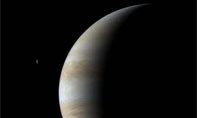 |
The Flight To Damascus |
This was his big moment.
Marcus Harrison had been staring at the blinking signal light for about thirty minutes now but still he hadn’t moved from the bunk. Sure, he was groggy from the effects of such a deep, extended cyber-sleep –who wouldn’t be after an entire month?- but he knew exactly where he was and, overall, felt just fine.
It was that the light was flashing bright red.
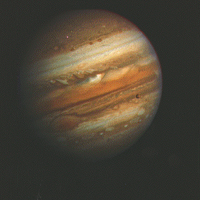 Not blue, for an incoming data upload, not amber for emergency –he’d been roused from slumber in the Main Asteroid Belt for that one before. Not even green to indicate that the trash disposal mechanism was in use, or any of the other half dozen colours the signal light could have displayed. No, this was indeed red. And that meant he’d finally arrived. They were waiting for him to answer, waiting for him to take a look out that window and make some grand, memorable statement over the intercom about humanity’s great exploring spirit; to speak of the fantastic achievements possible when old rivalries and disagreements were set aside.
Not blue, for an incoming data upload, not amber for emergency –he’d been roused from slumber in the Main Asteroid Belt for that one before. Not even green to indicate that the trash disposal mechanism was in use, or any of the other half dozen colours the signal light could have displayed. No, this was indeed red. And that meant he’d finally arrived. They were waiting for him to answer, waiting for him to take a look out that window and make some grand, memorable statement over the intercom about humanity’s great exploring spirit; to speak of the fantastic achievements possible when old rivalries and disagreements were set aside.
He was to inspire mankind.
Bah. Marcus rolled his eyes and sank back underneath the covers. That speech had been written for him by a government public relations ‘expert’ two whole years ago when he had first been chosen to leave Mars Station amid the pomp and ceremony of the farewell befitting a soon-to-be hero. He had wanted this –after all, he lobbied hard for the position and did everything needed to ensure his qualifications met the demands and expectations of the mission- but since that amber emergency about forty days ago he wasn’t so sure anymore.
Marcus had been hand picked by the World Space Organization (W.S.O for short) from thousands. He was, in every way, as perfect a human specimen as one could be at the age of thirty-five. Physically, he was strong and healthy and considered climbing the tallest peaks on Earth and Mars alike ‘a mere hobby’. Intellectually, he was brilliant. He held a doctorate in astrophysics as well as a degree in aerospace engineering and, to only further highlight his breadth of knowledge, a degree in classical studies. After a stint in the air force, eight years into his young career with the W.S.O he had advanced quickly through the ranks and easily become their most experienced pilot. He spearheaded both the landmark Argo-5 mining exploration missions that had been such huge practical and political successes in ensuring the viability of continued human survival on Earth as well as the career survival of certain elected leaders on that planet.
And of course, Marcus had two additional factors working in his favour. He was a handsome, marketable commodity, something indispensable in the hero creation business. Second, he had no extended family -no wife or children- to speak of. This didn’t flesh out the all-American hero folio as well as some might have hoped, but of course it made him indispensable in another neat, useful sort of way should something go awry in his travels. Photos of grieving loved ones splashed across the covers of glossy magazines back home didn’t bode well for the W.S.O’s future funding prospects.
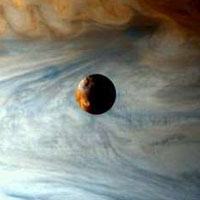 So much famine, destruction and terror had overtaken Earth in recent years that it was a surprise when the President made his now-famous policy assertion calling for renewed exploration deep into the solar system. Most argued that at this point in time government funds were surely best directed towards reinforcing the social service and security mechanisms so lacking in most aspects of the planet. At the same time, whether the President was driven by misguided optimism or a calculated measure to force distraction well away from his shortcomings, it certainly had been some time since humankind had reason to feel proud of themselves, let alone take on a sense of hope for the future. Wise or not, with the President’s seal of approval, Marcus soon found himself in the middle of the sixteen billion dollar ‘Mission Human Spirit’ programme. His goal? To be the first human to reach Jupiter, and the first to land on the moon of Europa.
So much famine, destruction and terror had overtaken Earth in recent years that it was a surprise when the President made his now-famous policy assertion calling for renewed exploration deep into the solar system. Most argued that at this point in time government funds were surely best directed towards reinforcing the social service and security mechanisms so lacking in most aspects of the planet. At the same time, whether the President was driven by misguided optimism or a calculated measure to force distraction well away from his shortcomings, it certainly had been some time since humankind had reason to feel proud of themselves, let alone take on a sense of hope for the future. Wise or not, with the President’s seal of approval, Marcus soon found himself in the middle of the sixteen billion dollar ‘Mission Human Spirit’ programme. His goal? To be the first human to reach Jupiter, and the first to land on the moon of Europa.
With so much at stake, Marcus was effectively ‘just along for the ride’ on this expedition. He’d be in an induced cyber-sleep for much of the way. His highly-touted piloting skills weren’t even needed on take-off, nor would he be put to any real work during the planned shift into Jupiter orbit or eventual landing on Europa but for any emergency that might arise. And, as with navigation of the spacecraft, all scientific tests had also been automated. Marcus’s job was merely to eat, shit, sleep, and deliver an inspiring speech when told to do so. This bothered him little- he could appreciate the risks and grand expectations at play on this mission, and he was honoured to merely have the opportunity to one day be mentioned in the same breath as his own heroes- names like Magellan, Columbus, Hillary and, naturally, that old flag-bearer, Armstrong.
The red light was still blinking.
Marcus glanced down at the slight bump on the underside of his left wrist where the microchip had been implanted. By now the W.S.O scientists back on Earth and Mars surely knew he was wide awake and must have been wondering why in the hell he still hadn’t bothered to get up and acknowledge the signal as per mission protocol. They could see that the structural integrity of the spacecraft was fine, that the radiation shields were well intact, Marcus’s oxygen tanks were still in good supply, and all systems were ‘go’. But in this, arguably the most important moment of his entire life, and the eyes of all humankind upon him, all Marcus could think about was that amber emergency of some forty days ago.
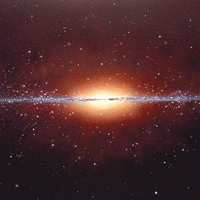 A collision between the spacecraft and an asteroid in the Mars-Jupiter belt had been considered highly unlikely and perhaps even closer to improbable. In eighty-five years of exploration not one space probe had ever been hit by an asteroid in the region. Ever. Nonetheless, it was a chance taken into account when the mission was first drawn up that Marcus may well be stirred from cyber-sleep should any such potential danger eventuate. As it happened, the amber alarm was being especially cautious when it went off five weeks into the mission. The offending asteroid, a pockmarked mere pebble some five metres in diameter called 842-Ria was nearly two miles away and posed no threat whatsoever yet, with those sixteen billion dollars and the expectations of humanity at stake, no one was taking any chances, so Marcus had been woken up as to keep a watchful eye on things.
A collision between the spacecraft and an asteroid in the Mars-Jupiter belt had been considered highly unlikely and perhaps even closer to improbable. In eighty-five years of exploration not one space probe had ever been hit by an asteroid in the region. Ever. Nonetheless, it was a chance taken into account when the mission was first drawn up that Marcus may well be stirred from cyber-sleep should any such potential danger eventuate. As it happened, the amber alarm was being especially cautious when it went off five weeks into the mission. The offending asteroid, a pockmarked mere pebble some five metres in diameter called 842-Ria was nearly two miles away and posed no threat whatsoever yet, with those sixteen billion dollars and the expectations of humanity at stake, no one was taking any chances, so Marcus had been woken up as to keep a watchful eye on things.
What really alarmed Marcus, however –what had really changed his view on matters altogether- was not some mere asteroid that would never hit his well-shielded spacecraft. It was the sight of Jupiter looming off in the distance. There, through that deep, black sky of nothingness he spotted the giant planet and caught a glimpse that was unlike any he’d ever seen before. It was one thing to have studied photos of Jupiter and the famous Great Red Spot back on Earth- another to have actually viewed the planet on a daily basis from Mars Station during his eighteen months of training. There it shone brightly enough that you could make out features on the planet’s surface with the naked eye. But even on Mars, Jupiter had still seemed so far away. It still seemed somewhat unreal.
In that asteroid belt though… peering out the window towards a Goliath he was soon to meet… Marcus abruptly began to take on a sense of the true immensity of the planet that no snapshots, data or telescopes could ever have conveyed. It was as if he could quite literally feel the sheer size of the blessed thing, some eleven times larger than his home.
How small I’ll feel when I finally get there, he thought.
It will swallow me whole.
And what really concerned Marcus as his gaze wavered anxiously away from Jupiter that day was how, still over a month’s travel from his destination, he hadn’t felt excited or thrilled about nearing his trailblazing goal. Not even close. Instead, as he’d shifted from the window and back to his bunk for another induction into cyber-sleep he was taken over by one emotion and one emotion only:
Dread.
Now, still lying in the spacecraft and eyeing that red signal light, Marcus’s mind wandered to a line of scripture from the Bible he’d recalled from his youth. He was never an especially religious man; as a child back in small town Arkansas his mother near had to drag him to Sunday school each and every week. But for whatever reason as the giant waited for him outside, one particular passage kept coming back to Marcus in that bunk. It was from Acts -at least he thought it was- and it spoke of St. Paul on the road to Damascus:
And, as he journeyed, he came near Damascus: and suddenly shined round him a light from heaven.
It was said that this bolt of light, this at once majestic, inspiring and terrifying light from heaven blinded Paul for three days.
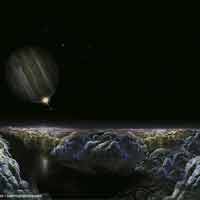 As the feeling of dread sank further into his gut, Marcus wondered if there were some things that humans were never meant to see. That perhaps they were not even equipped to see. Maybe this vast planet waiting outside his spacecraft window was a vision into a kind of ‘heaven’ of such extremity that it would be beyond his own intellectual, physical and sensory comprehension. Beyond his capacity. Beyond his limits.
As the feeling of dread sank further into his gut, Marcus wondered if there were some things that humans were never meant to see. That perhaps they were not even equipped to see. Maybe this vast planet waiting outside his spacecraft window was a vision into a kind of ‘heaven’ of such extremity that it would be beyond his own intellectual, physical and sensory comprehension. Beyond his capacity. Beyond his limits.
Again the red signal light flashed, but this time with an additional amber alarm from the engineers back at base. They were getting restless.
Clenching his fists tightly as he struggled to concentrate, Marcus stopped trying to imagine what lay beyond the window. He stopped trying to form a picture of what he’d seen in the asteroid belt that day but now magnified a thousand times. He stopped wondering exactly how huge this planet must be to have jolted the spacecraft’s gravity sensors with such a degree of force upon reaching orbit a few moments ago. He swallowed hard, sat up in the bunk, and allowed a perverse clarity of his own impending doom to take over. It was time. Marcus cared no more for warning lights and emergency alarms from home. There was no turning back now, and he would not allow himself to be paralysed by self-manufactured fear when a vision of heaven awaited him mere steps away.
His fate was at the window.
Carefully, slowly, Marcus walked over. He placed his hands on either side of the frame, took a deep breath and looked out.
As the truth coursed through him, Marcus smiled weakly.
He was right.
The swirling reds and yellows of the glorious beast filled his entire field of view. Gone was the soulless black of space, replaced by a thousand hues of bright colour that banded back and forth across each other and became the tapestried sky. Clouds and storms that could eat entire planets whole howled at Marcus from down below, calling him in to peer deeper. If the universe was a whole being, then surely Marcus now found himself staring into the very eye of God. Fleetingly, as the dread, awe and anxiety mixed with every other emotion and drifted out of him, Marcus thought he saw home again somewhere in those clouds. The lush, green pastures of the farm. A mother preparing breakfast. And a father, with a kiss, setting out on that day from which he never returned.
Images overlapped again and again, until the quiet of this most private viewing swelled into a roar of silence that filled Marcus’s ears so much they ached. He was alone here, alone in this unnerving grandeur. He begged his mind to reach for home again -for comfort, for meaning- yet all he mustered from the strain was a single tear that marked his paling cheeks before the magnitude of this colourful, cosmic revelation beset him once again.
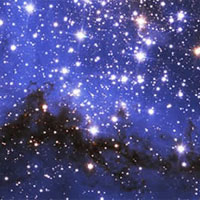 For now the memories became fainter, harder to cling to, and the maelstrom spat lightning eighteen miles wide and just as high that sapped Marcus of his life. It was leaving him- this he truly knew. He wished he might disappear into the ether as his mind fell blank and the majesty of it all consumed him. His arms fell limp by his side, and Marcus sank to the floor.
For now the memories became fainter, harder to cling to, and the maelstrom spat lightning eighteen miles wide and just as high that sapped Marcus of his life. It was leaving him- this he truly knew. He wished he might disappear into the ether as his mind fell blank and the majesty of it all consumed him. His arms fell limp by his side, and Marcus sank to the floor.
With his last dying breath he looked heaven in the eye and yielded to the end of his time.
The signal light continued to flash bright red until it, too, was consumed, and the tiny spacecraft drifted on toward an endless orbit into eternity.
The curious back on Earth and Mars were left to wonder why and why again.
